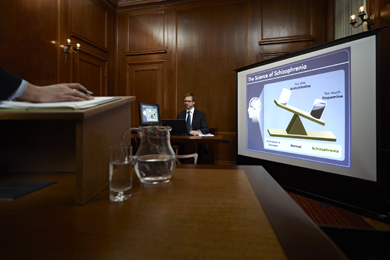Finding Your Wizard Before You Get to Oz
“Pay no attention to that [person] behind the curtain.” -The Wizard.
That should be your goal. You should have so much trust in the person pulling the levers, pushing the buttons and turning the knobs, that you know the magic will just happen. This trust in the person who oversees your technology at trial is critically important to reducing your anxiety when using trial technology. A great trial technician is a security blanket. But what happens if you don’t have access to that technician? What if, for whatever reason, your wizard in unavailable. Now what?
From a sea of potential wizards, how do you vet out a new technician to sit behind the curtain and make sure the machines hum along? Here are some key characteristics to look for when you are seeking a candidate to carry the burden of being your evidence magician:
Focus
Focus is a rare trait to have in the digital age. Just look at all the people buried in their smart devices. When you meet a new trial tech candidate, look for personality traits that convey the ability to focus. Are they looking at their phones while in conversation? Are they paying attention to you or looking away?
Nick Morgan, author of the book “Power Cues: The Subtle Science of Leading Groups, Persuading Others, and Maximizing Your Personal Impact” lists a number of ways to determine if someone is zoned out and not focused on your conversation:
Their eye contact is too fixed, and their heads are too still
A real conversation is relaxed and has flow. Morgan states that it is full of “anticipatory nods and hand-offs of eye contact in order to allow a smooth conversational ping-pong.”
They smile too brightly and for too long.
Morgan explains that adults are very good at controlling their faces. That awkward smile and the feeling like you are being looked through, instead of at, might mean they are not focused on the conversation.
They don’t mirror your body language.
When people are in sync in a conversation they tend to mirror each other’s body language. If they are not mirroring your gestures and body language, it could mean they are not focused on you and the conversation.
Experience
Naturally, you will want a tech who has varied experience from an assortment of different kinds of cases. Along with the requisite experience with trial presentation software, such as Trial Director or OnCue, you will want to inquire about experience with presentation equipment, traveling off-site for trials, and knowledge of additional software programs such as PowerPoint, the Adobe Suite and various computer operating systems.
Find out what kinds of cases they have worked on, how many trials they typically do in a year, how long their trials last, and the types and sizes of law firms they have supported.
Understanding
Does your tech ask you the right questions? Do they have an understanding of courtroom decorum and terminology? Do they know it is not an Opening Argument but an Opening Statement? Make sure to listen to the words your potential wizard uses for insight into their understanding of the legal process.
Anticipation
Let your technician talk about themselves and look for their ability to answer questions you may not even know you had. The secret sauce for a great courtroom technician is their ability to appear as a mind reader. If you have worked with a great technician, you will know the feeling. Good wizards will get into your head and it will feel like they know the answer to the question before you even ask it (it helps when they have a copy of your outline). They will know where you are going next and anticipate what needs to be done. You can often see glimpses of this when meeting with a new technician by their ability to explain how they will work with you.
Your case is far too important to muck it up with technology problems. You don’t have to touch the stove to learn the lesson that it is hot. Spending some time thinking about how you will vet out your next trial technician means you are less likely to throw away hours, weeks and sometimes years of preparation because of a technical glitch at a critical moment in front of the jury.


